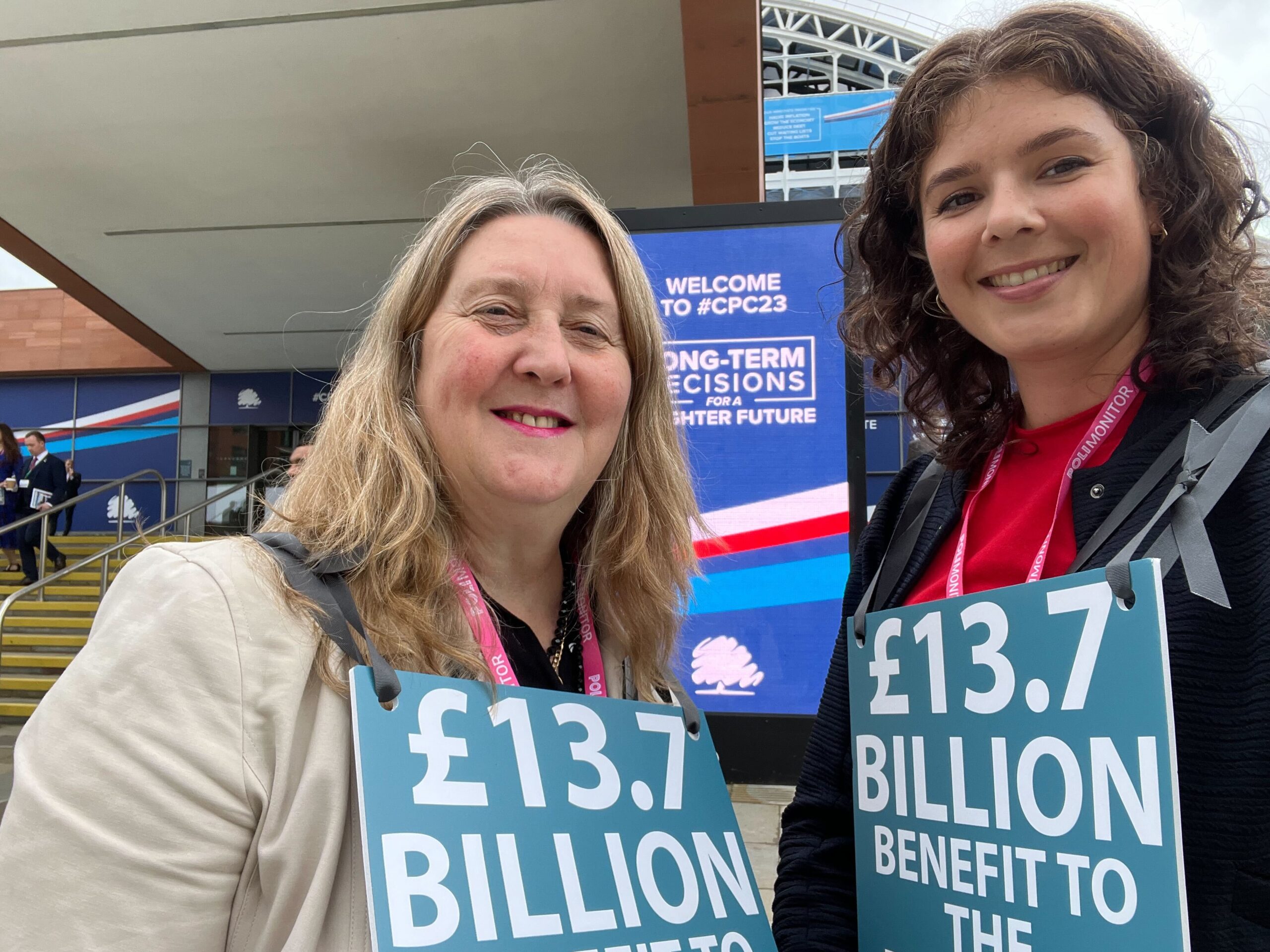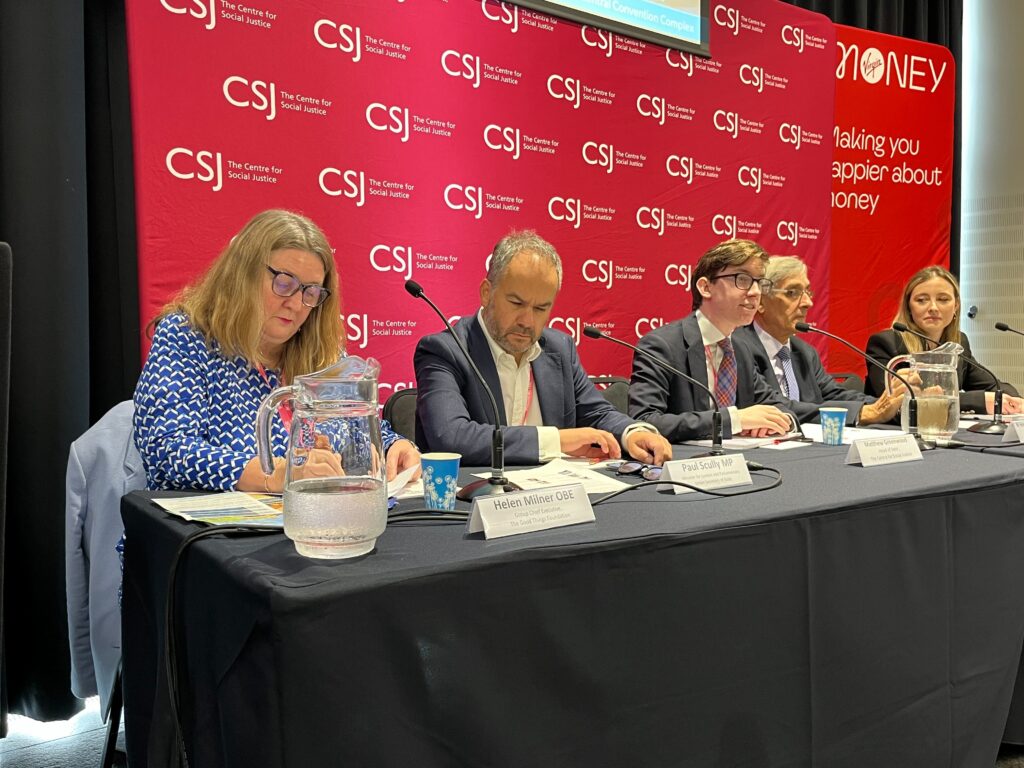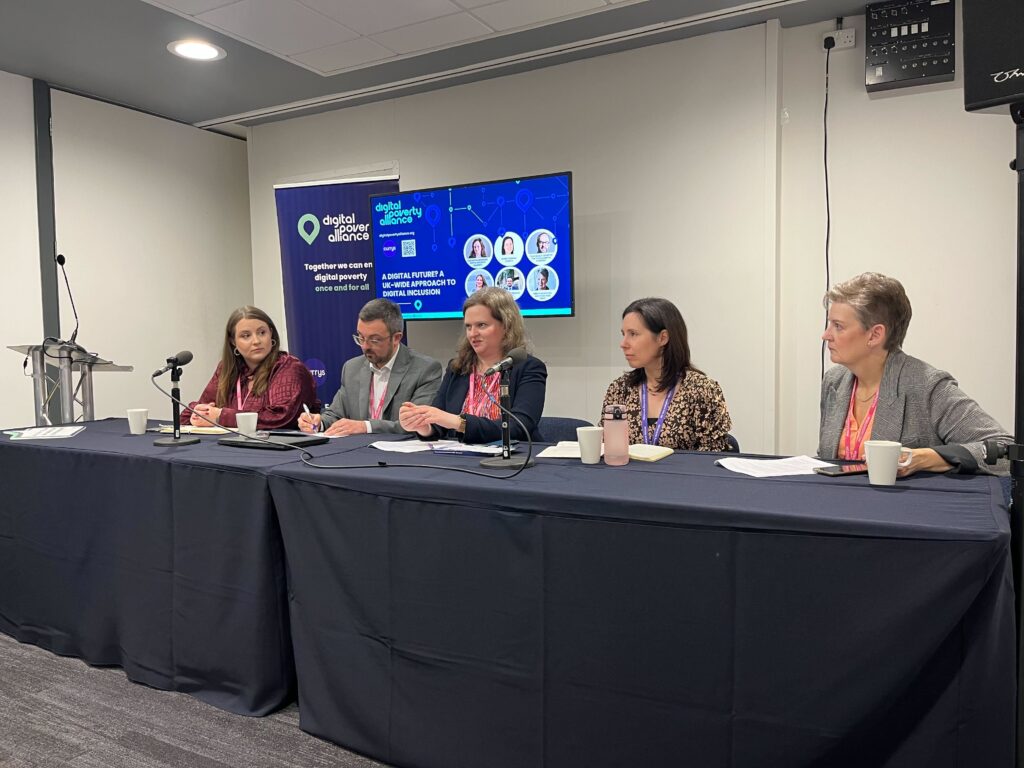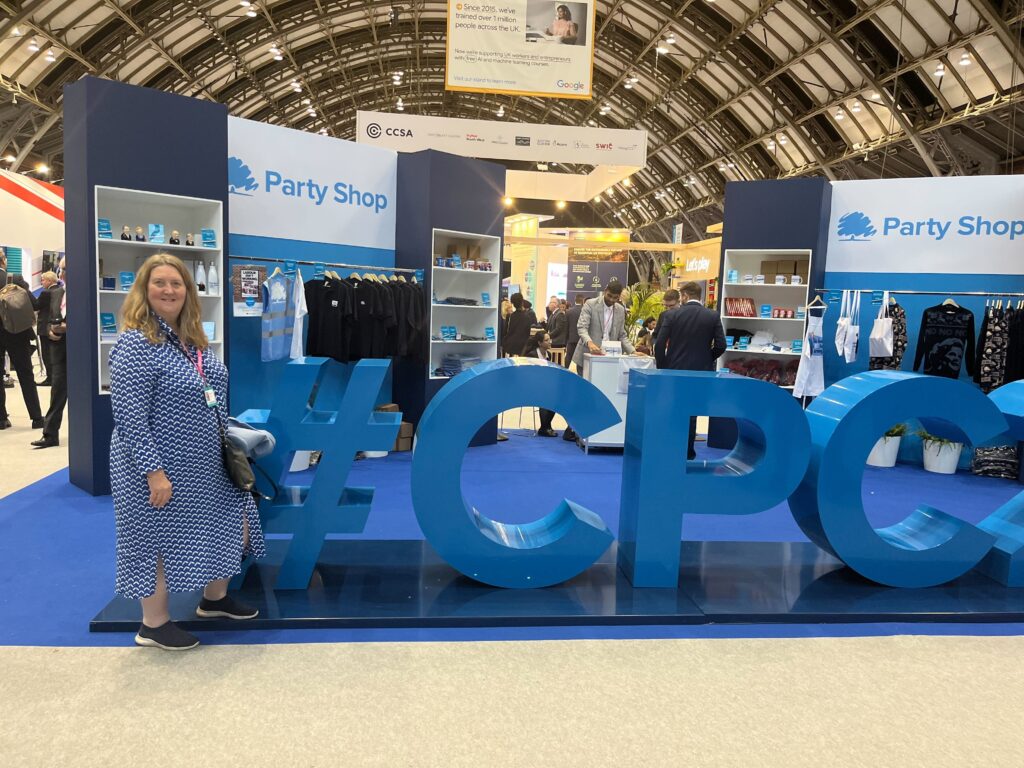Good Things at Conservative Party Conference ‘23
Ever wondered what goes on at a political party conference? How do charities get their voices heard amongst all the other news-worthy activities? I’ll be updating this blog daily to share our insights and observations at (potentially) the last party conference before the next general election.
Ever wondered what goes on at a political party conference? How do charities get their voices heard amongst all the other news-worthy activities? I’ll be updating this blog daily to share our insights and observations at (potentially) the last party conference before the next general election.
Sunday 1st October
I was expecting a typical grey and dreary Manchester as our train pulls into Piccadilly station, but instead we’re met with humidity and a buzz of anticipation in the air, as the Conservative party conference kicks off in this industrial city.
We’re led to believe that this is the final autumn party conference ahead of a general election and we’ve recently seen a wave of new policies: rolling back of green initiatives, a(n even) harder line on immigration and the (potential and unconfirmed) cancelling of HS2. These new policies come with new branding: Long term decisions for a brighter future.
The conference comes as those in the digital inclusion sector await the Government’s response to the House of Lords Communications and Digital Committee’s report exploring digital exclusion. The report, launched earlier this year, didn’t hold back – blaming Government apathy for this deepening issue facing millions of people in the UK today.
So our CEO, Helen Milner, and I packed our suitcases (including our fabulous sandwich boards) and travelled across the pennines to put digital inclusion on the agenda – to ensure that those long term decisions include fixing the digital divide (for a brighter future!)
On Sunday, we attended a CSJ panel, looking at how the country can bounce back, post-Covid. Despite the political divide between Conservative MP, Miriam Cates, CSJ founder Iain Duncan Smith and Greater Manchester Combined Authority Mayor Andy Burnham, there was agreement about the importance of education, housing and transport – and the urgent need to provide security to people who are struggling.
Later, we joined our strategic partners, Vodafone, for a drinks reception. Wearing our sandwich boards adorned with: £13.7 BILLION BENEFIT TO THE ECONOMY, TO FIX THE DIGITAL DIVIDE we found ourselves gaining the attention we were looking for – from people telling us that their relatives are digitally excluded, to those commending our work and others challenging our claim – and being pleased that we are talking about a benefit to the economy, rather than asking for funding (we’ll get round to that later in the conversation!).
As announcements from the conference make the news, with Jeremy Hunt announcing sanctions of those on Universal Credit if they’re not actively seeking employment – we’re here to ask questions like: How can digitally excluded people even apply for Universal Credit? The answer is simply that they can’t. You need to be online to apply.
Over the next few days, we will be attending panel discussions and roundtables, asking pertinent questions and gaining insight into what makes the decision makers of our country tick and how we can inspire them to make digital exclusion a priority.

Monday 2 October
It was a great day for the team from Good Things Foundation at Conservative Party Conference, and after breakfast we made our way to Manchester Central for our first panel.
Hosted by think tank the Centre for Social Justice alongside our good friends at Virgin Money (who host 50 Databanks, and counting, in their venues on high streets across the country) the topic was the poverty premium and digital exclusion. Both terms aren’t widely known, in fact our recent polling demonstrated that 46% of adults in the UK don’t know the term ‘digital exclusion’ – but I’d hope that if you’re reading this blog, that you do know what digital exclusion means and the negative impact that being excluded can have on people’s lives. However, you may not know that poverty premium means – it’s the idea that people on low-incomes pay more for essential goods and services.

Our Group CEO, Helen, joined Paul Scully MP, Tamara Dewhirst from Virgin Money and John Redwood MP and outlined how we work with the National Digital Incusion Network to provide connectivity data, devices and skills to digitally excluded people. Helen said, “You are five times more likely to be digitally excluded if you’re on a low income” and those who are digitally excluded pay more for goods – with no access to online only deals and offers. There was consensus across the panel that digital exclusion is a whole Government problem and the solution lies in collaboration between decision makers, like the MPs on our panel, alongside industry and the civil society – co-creating solutions together.
At this morning panel, we were pleased to learn that the Government’s response to the House of Lords Communications and Digital Committee report into digital exclusion is due after recess (the break when political parties host their annual conferences). We heard how Paul Scully MP has been exploring opportunities for Government to lead the way by donating devices for refurbishment and social good, alongside a cross governmental approach to tackling digital exclusion.
As the rain finally arrived, we jumped into another panel – and asked about how we support working age people with the essential digital skills they need. A theme for the day, in response to questions about digital exclusion is that collaboration and investment is key, as Matt Robinson from Tech UK agreed.
Completing our day of digital exclusion panels, we headed upstairs in the conference centre to join Digital Poverty Alliance and Curry’s for their fringe event: A digital future? A UK-wide approach to digital inclusion. The conversation highlighted the need for data, devices and skills, alongside the motivation to get online, with Paul Scully MP stating that digital inclusion “is important for WELLBEING and not just economic wellbeing”.

At the event, Digital Poverty Alliance launched Deloitte research looking at digital poverty in the UK, with the key finding that approximately 13 – 19 million adults are living in digital poverty.
On this panel, I heard my favourite quote of the day, from Kirsty McIntosh at Scottish Tech Army who believed that we should be showing elderly people on TV using tech: “You never see Dot Cotton doing her online banking on Eastenders! We’re not using our propaganda machines correctly!”
If you’re reading this blog, you may be interested in our work tackling digital exclusion and maybe you want to know what it’s actually like to visit a political party conference – how does it work? Do the conversations that charities have with decision makers at these events actually lead to change? I would say that I hope so. We need to work together with policy makers, we need to educate and inform – to highlight the work of community organisations in the National Digital Inclusion Network, and bang the drum for support from both Government and industry.

Tuesday 5 October
Day three at Conservative Party Conference, and as I walked from my hotel, I passed the Trussell Trust adverts, calling for Rishi Sunak to do more to help people afford the essentials. The chants of “Tories out!” from protestors – and later, doctors – echoed through to the secure zone. The streets were lined with police, armed guards, people with placards, and someone dressed as Betty the Badger, campaigning against the badger cull.
It’s in this charged environment that multiple charities, like us, are here to state our case – looking to inspire parliamentarians, to tell the stories of people we support and the community organisations that exist to make their neighbourhoods better places by improving the lives of local people.
The way to do this, is to speak to those in power – to join panel discussions, to ask questions to those speaking, to try and get some face-to-face time with someone who works in your area of expertise – whether this is digital and tech, or healthcare.
Another way to get attention is to make yourself stand out. Amongst a sea of navy suits, Helen and I wore our sandwich boards, propped them up on the panel when Helen spoke, and posed for a few pictures with people. This seemed to work! We met lots of people who had never heard of the digital divide, who agreed that an extra £13.7 billion would be good for the economy, if digital exclusion was addressed. We joined panels, and spoke to many people who agreed that we couldn’t leave people behind, that levelling up hadn’t gone far enough and that we have a long way to go.
But sometimes it’s good to break out of your silo and explore what else is being said by those in power. So first thing, I went along to the keynote speeches in the main hall to see Secretary of State for Health and Social Care, Steve Barclay; followed by Secretary of State for Science, Innovation and Technology, Michelle Donelan and finally Secretary of State for Levelling Up, Housing and Communities, Michael Gove.
Amongst announcements of new funding, such as an £8m increase towards AI scholarships and investment in tech for the NHS (but not whether that will be patient-used tech), alongside plans to improve internet services in rural areas, the speakers used the opportunity to state that Labour has thwarted their growth plans and to attack so-called “woke ideology.” I won’t go into that further in this blog, as there are no doubts hundreds of articles outlining the comments, and thousands upon thousands of social media posts about the same subjects.
Back to the digital inclusion sector events – where Group CEO, Helen Milner joined TechUK and DXC Technology for a panel discussion on Digital and cyber skills: Unlocking UK business’ potential. Once again, Helen was joined by Paul Scully MP, who spoke about supporting people to gain skills in AI – which much of the conversation focused on – and Helen brought it back to those with low or no digital skills – highlighting how for the UK to become a tech superpower, we need to address the inequality and skills gaps.
On Tuesday afternoon, I went to an IPPR event, where three Conservative MPs and a pollster discussed the future of Conservatism where the conversation weaved from levelling up (according to JL Partners, 70% of people in ‘the red wall’ have said that their area has become worse, not better, since levelling up began) to how to gain younger voters. The panel proclaimed levelling up needed to continue, but that it has been an issue for a very long time, and that the Government needs to up its tech ambitions to become a ‘UK superpower’.
And this is where I left the Conservative Party Conference, taking one of the last trains back to Sheffield before the rail strike on Wednesday morning – missing Rishi’s speech in the process.
Our Advocacy Manager, Hannah Whelan will be picking up the baton next week at Labour Party Conference where she’ll be blogging about how our three policy asks are received by the opposition party, and whether there’s an appetite from those who may soon be the next Government to tackle digital exclusion.
